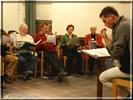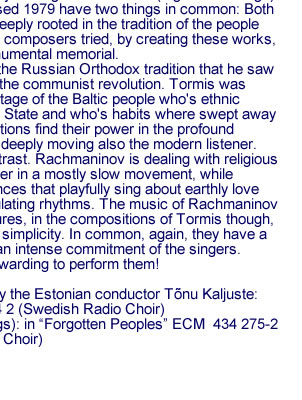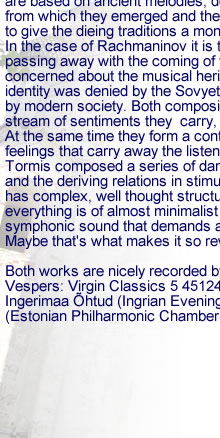The “Vespers” (or All-Night Vigil) by Sergej Rachmaninov (1873
- 1943) composed in 1915 and the song cycle “Ingerimaa Õhtud” (Ingrian
Evenings) by Veljo Tormis (1930 -) composed 1979 have two things in common:
Both are based on ancient melodies, deeply rooted in the tradition of the people
from which they emerged and the composers tried, by creating these works, to
give the dieing traditions a monumental memorial.
In the case of Rachmaninov it is the Russian Orthodox tradition that he saw
passing away with the comming of the communist revolution. Tormis was concerned
about the musical herritage of the Baltic people who's ethnic identity was
denied by the Sovyet State and who's habits where swept away by modern society.
Both compositions find their power in the profound stream of sentiments they
carry, deeply moving also the modern listener.
At the same time they form a contrast. Rachmaninov is dealing with religeous
feelings that carry away the listener in a mostly slow movement, while Tormis
composed a series of dances that playfully sing about earthly love and the
deriving relations in stimulating rhythms. The music of Rachmaninov has complex,
well thought structures, in the compositions of Tormis though, everything is
of almost minimalistic simplicity. In common, again, they have a symphonic
sound that demands a intense commitment of the singers. Maybe that's what makes
it so rewarding to perform them!
Both works are nicely recorded by the Estonian conductor Tõnu Kaljuste:
Vespers: Virgin Classics 5 45124 2 (Swedish Radio Choir)
Ingerimaa Õhtud (Ingrian Evenings): in “Forgotten Peoples” ECM
434 275-2 (Estonian Philharmonic Chamber Choir)






